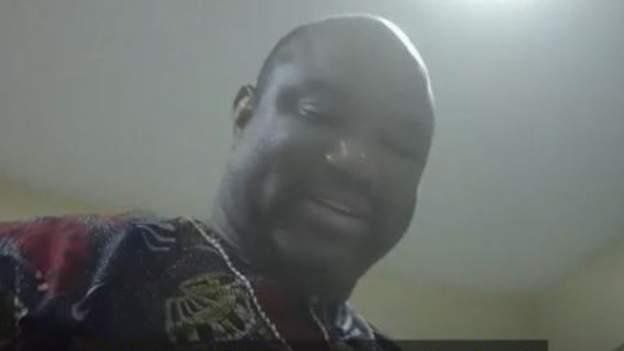#SexForGrades: Calls for action after BBC Africa Eye film
- Published
The BBC film, fronted by journalist Kiki Mordi, has encouraged people to speak out
West African politicians and film stars are among thousands calling for action following a BBC report into sexual harassment at top universities.
A year-long investigation by BBC Africa Eye, released on Monday, explored the harassment at the University of Lagos, Nigeria, and the University of Ghana.
The film showed lecturers propositioning undercover journalists.
Three of the men featured, two in Ghana and one in Nigeria, have now been suspended pending investigations.
The Nigerian academic Dr Boniface Igbeneghu has made no comment.
The two Ghanaians, Professor Ransford Gyampo and Dr Paul Kwame Butakor, have denied they were offering "sex for grades" in the undercover exchanges.
Social media users and high-profile figures are demanding action and sharing their own experiences.
The documentary highlighted a well-known phenomenon that some academics use their position to force students into having sex.
Nigeria's First Lady, Aisha Buhari, said on Monday that the current situation "simply has to change".
"It is no longer enough to sweep allegations under the carpet or force victims to withdraw their allegations, victimise or stigmatise them," she said at a premiere.
The first lady of Ekiti state, Bisi Fayemi, added her voice - while revealing she was also a victim of campus sexual harassment.
"It is time for us to speak up and speak out and for those who do we need to stand with them and not silence them. Because the culture of silence has endured long enough," she said at Monday's Lagos screening.
"Sex for grades": Undercover in West African universities
The title of the film, Sex for Grades, trended on Twitter in both Nigeria and Ghana on Monday - with hundreds of thousands of mentions and shares.
Many users condemned the actions seen on the film and called for a swift response, while others shared their own alleged experiences.
Nigerian actress Dakore Egbuson-Akande told her 1.1 million Instagram followers "I have also suffered this". She added that she hopes the film and subsequent discussion marks the start of a #TimesUp-style movement against sexual violence and harassment in the region.
"Women in Nigeria have been suffering all sorts of sexual assault and violence for far too long. Let's keep the conversation going," she posted. "You can only attack what you confront."
Allow Instagram content?
This article contains content provided by Instagram. We ask for your permission before anything is loaded, as they may be using cookies and other technologies. You may want to read Meta’s Instagram cookie policy, external and privacy policy, external before accepting. To view this content choose ‘accept and continue’.

The University of Lagos has suspended a lecturer, Dr Igbeneghu, who was caught on film propositioning one undercover reporter, who posed as a 17-year-old. The University of Ghana has also suspended two of its academics, Prof Gyampo and Dr Butakor, saying it will carry out an investigation.
The BBC report carried details from current and former students, some with their identities hidden, making allegations against university staff.
Femi Gbajabiamila, the speaker of Nigeria's House of Representatives, said the revelations called for a "moment of reckoning" for the country.
Allow X content?
This article contains content provided by X. We ask for your permission before anything is loaded, as they may be using cookies and other technologies. You may want to read X’s cookie policy, external and privacy policy, external before accepting. To view this content choose ‘accept and continue’.
Allow X content?
This article contains content provided by X. We ask for your permission before anything is loaded, as they may be using cookies and other technologies. You may want to read X’s cookie policy, external and privacy policy, external before accepting. To view this content choose ‘accept and continue’.
The BBC has already been contacted by more than 120 people sharing personal stories of alleged abuse and harassment in education since the documentary aired.

Do you have a story of sexual harassment by a lecturer at university? How have you been affected by our investigation into sex for grades?
If you would like to share your experience with BBC Africa Eye, please submit your message below
Because of the volume of messages we receive we cannot respond to everyone, but we appreciate every response.

Share your experiences using this form:
If you are reading this page and can't see the form you will need to visit the mobile version of the BBC website to submit your question.
- Published8 October 2019
